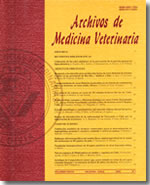A DNA vaccine encoding p39 and sp41 of Brucella melitensis induces protective immunity in BALB/c mice
Main Article Content
Abstract
Brucella species are facultative intracellular gram-negative bacteria that can multiply within phagocytic and non-phagocytic cells of humans or animals as end hosts. B. melitensis causes abortion in pregnant animals and undulant fever in humans. A 41 kDa surface protein (sp41) is associated with bacterial adherence and invasion of HeLa cells. The role of this protein a is important for the interaction with host cells. Previously, the putative periplasmic binding protein p39 had been described as T-cell immunodominant Brucella antigens. Both vectors (pCIp39 and pCIsp41) induced antigen-specific serum immunoglobulin as well as a T-cell-proliferative response and a strong gamma interferon production upon re-stimulation with either the specific antigens or Brucella extract. The level of protection was significant in pCIp39 and pCIsp41 treated mice but it was lower than the required level.

